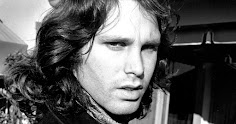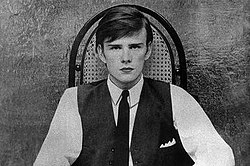Whether he
lacked the talent or time to develop into a great poet remains unclear. Much of
Jim Morrison’s brief life is obscured—perhaps strategically—with vague
pronouncements, clumsy metaphors, spacey diatribes and art house pretension.
But when he was great, he drifted far beyond expectations, completely original,
yet always too smart for the job.
Importantly,
Jim Morrison looked like a rock star.
The image matched the music—perfectly. In 1967, he invented how a rock star
must appear—the hair, the leather pants, the boots, even the attitude. So
powerful is the image of Morrison that his influence remains undiminished.
With The Doors, he found a band to match his dark visions. Ray Manzarek’s brooding organ seemed wired to Morrison’s dread. When Morrison died, so did The Doors, though they struggled for a while, pushed on by the momentum of their silent singer.
He grew
uncomfortable with show business, more artist than magician, more preacher than
singer, hungering for fame until aware too late his soul had stopped. You can
rage from the stage but only think on the page.
Restless demons empowered his words. He battled bravely until no drug or drink could forestall The Big Sleep—which was his end game anyway. Or maybe not. With months to live, he was trying to get better in Paris, get his lungs back, repair a heart damaged by rheumatic fever, but never made it. His girlfriend didn’t help. Or maybe it was all predestined, just as he had predicted. Like his contemporary, George Harrison, much of Morrison’s life seems passed in preparation for death. And Death always obliges the eager.
At Pere Lachaise Cemetery, Jim Morrison appears nightly, courtesy of The 27
Club, alone in a dimly lit corner, forever searching for that single, indelible, timeless line that always tells the truth.
#jimmorrison #thedoors #lizardking #lawoman #lightmyfire #classicrock #perelachaise #georgeharrison #1960s #rock #music #27club #losangeles #whiskeyagogo














